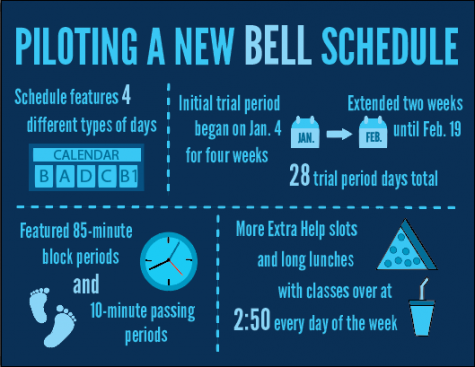Upper schools ends trial period for pilot bell schedule
Sarah Gonzalez (11) and other students pick up donuts for dessert during lunch on Friday. The trial period of the pilot bell schedule, which ended today, featured long lunches on every alternate day of the week.
February 19, 2016
Upper school students and faculty finished their six week trial period of the pilot bell schedule today and will return to the old schedule on Monday.
The pilot bell schedule featured four different types of days: A, B, C and D. Each class was held every alternate day in 85 minute block periods with 10 minute passing periods in between. Every school day began at 8 a.m. and ended at 2:50 p.m. The schedule also incorporated more long lunches and extra help periods and a collaboration period after school.
Challenge Success, a club that works to reduce student stress, worked with faculty committees and the administration to design the pilot bell schedule. Club officers announced the trial period of the pilot bell schedule at a school meeting in October.
“A lot of other schools in the Bay Area and research has shown that block schedules reduce stress in most students; that was the goal of Challenge Success and that’s still its goal,” Challenge Success officer Sandip Nirmel (11) said.
The trial period was initially designed to last four weeks starting from Jan. 4, but positive feedback and the need for more data in order to make a decision about the future of the schedule led to the trial period being extended two more weeks to today.
Although some students initially disliked the pilot bell schedule at the beginning of the trial period, several discovered elements of the schedule that they found helpful.
“At first, I hated [the new bell schedule] with a passion because they had given me a plethora of projects, tests, and quizzes all in the same week, but afterwards, when we started off a new semester, it was great. It’s a lot less stressful,” Linus Li (10) said.
Administration and faculty committees designed the schedule with the intent of reducing student stress by providing a less hectic learning environment, which some students felt the effect of by not having each class every day.
“[The new bell schedule] gives you more time between classes, so now we don’t have every single class on Mondays since we don’t have homework for every class on Monday,” Challenge Success officer Naomi Molin (12) said. “I know that the administrators and faculty, they have been researching this kind of schedule for a while.”
The pilot bell schedule will be implemented in the next academic year after the administration considers the data received from the trial period and makes the appropriate changes needed for the schedule to run smoothly.




![LALC Vice President of External Affairs Raeanne Li (11) explains the International Phonetic Alphabet to attendees. "We decided to have more fun topics this year instead of just talking about the same things every year so our older members can also [enjoy],” Raeanne said.](https://harkeraquila.com/wp-content/uploads/2025/10/DSC_4627-1200x795.jpg)


















![“[Building nerf blasters] became this outlet of creativity for me that hasn't been matched by anything else. The process [of] making a build complete to your desire is such a painstakingly difficult process, but I've had to learn from [the skills needed from] soldering to proper painting. There's so many different options for everything, if you think about it, it exists. The best part is [that] if it doesn't exist, you can build it yourself," Ishaan Parate said.](https://harkeraquila.com/wp-content/uploads/2022/08/DSC_8149-900x604.jpg)




![“When I came into high school, I was ready to be a follower. But DECA was a game changer for me. It helped me overcome my fear of public speaking, and it's played such a major role in who I've become today. To be able to successfully lead a chapter of 150 students, an officer team and be one of the upperclassmen I once really admired is something I'm [really] proud of,” Anvitha Tummala ('21) said.](https://harkeraquila.com/wp-content/uploads/2021/07/Screen-Shot-2021-07-25-at-9.50.05-AM-900x594.png)







![“I think getting up in the morning and having a sense of purpose [is exciting]. I think without a certain amount of drive, life is kind of obsolete and mundane, and I think having that every single day is what makes each day unique and kind of makes life exciting,” Neymika Jain (12) said.](https://harkeraquila.com/wp-content/uploads/2017/06/Screen-Shot-2017-06-03-at-4.54.16-PM.png)








![“My slogan is ‘slow feet, don’t eat, and I’m hungry.’ You need to run fast to get where you are–you aren't going to get those championships if you aren't fast,” Angel Cervantes (12) said. “I want to do well in school on my tests and in track and win championships for my team. I live by that, [and] I can do that anywhere: in the classroom or on the field.”](https://harkeraquila.com/wp-content/uploads/2018/06/DSC5146-900x601.jpg)
![“[Volleyball has] taught me how to fall correctly, and another thing it taught is that you don’t have to be the best at something to be good at it. If you just hit the ball in a smart way, then it still scores points and you’re good at it. You could be a background player and still make a much bigger impact on the team than you would think,” Anya Gert (’20) said.](https://harkeraquila.com/wp-content/uploads/2020/06/AnnaGert_JinTuan_HoHPhotoEdited-600x900.jpeg)

![“I'm not nearly there yet, but [my confidence has] definitely been getting better since I was pretty shy and timid coming into Harker my freshman year. I know that there's a lot of people that are really confident in what they do, and I really admire them. Everyone's so driven and that has really pushed me to kind of try to find my own place in high school and be more confident,” Alyssa Huang (’20) said.](https://harkeraquila.com/wp-content/uploads/2020/06/AlyssaHuang_EmilyChen_HoHPhoto-900x749.jpeg)










